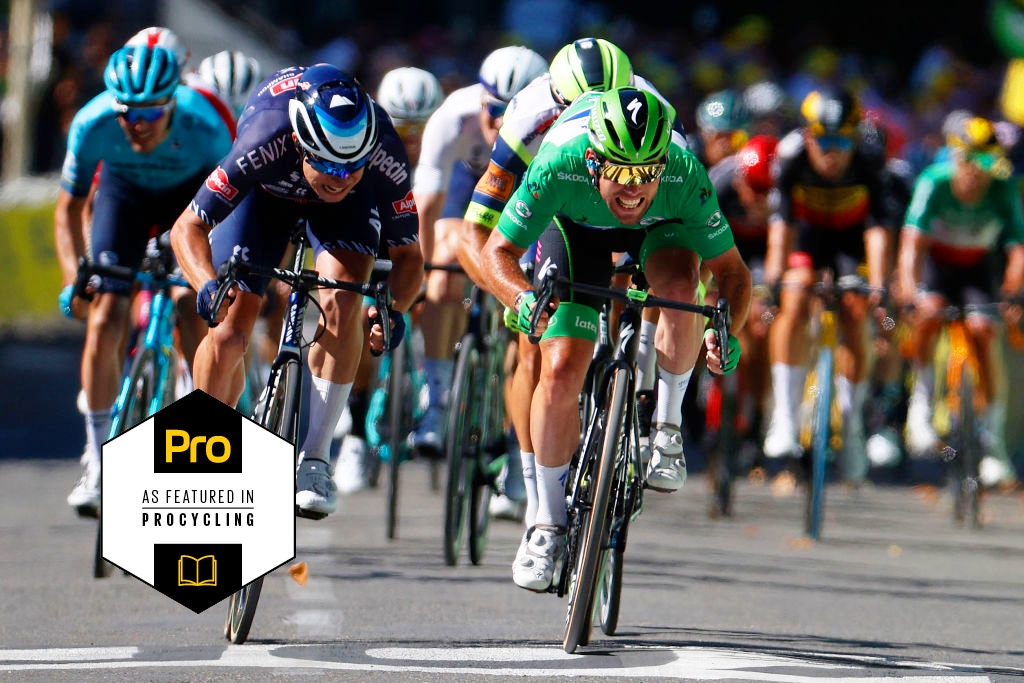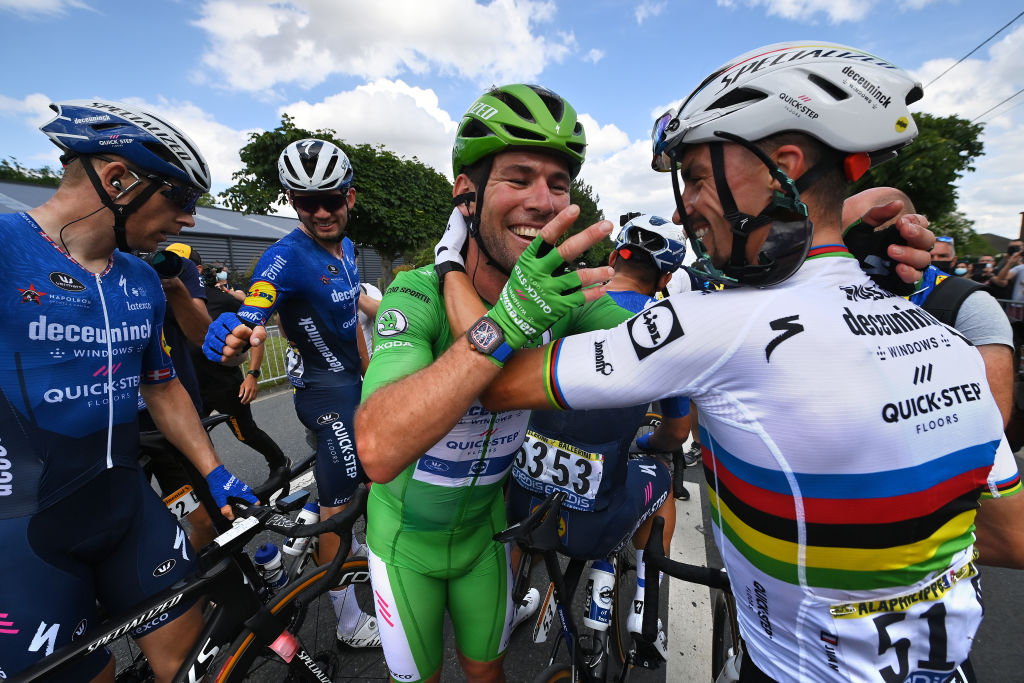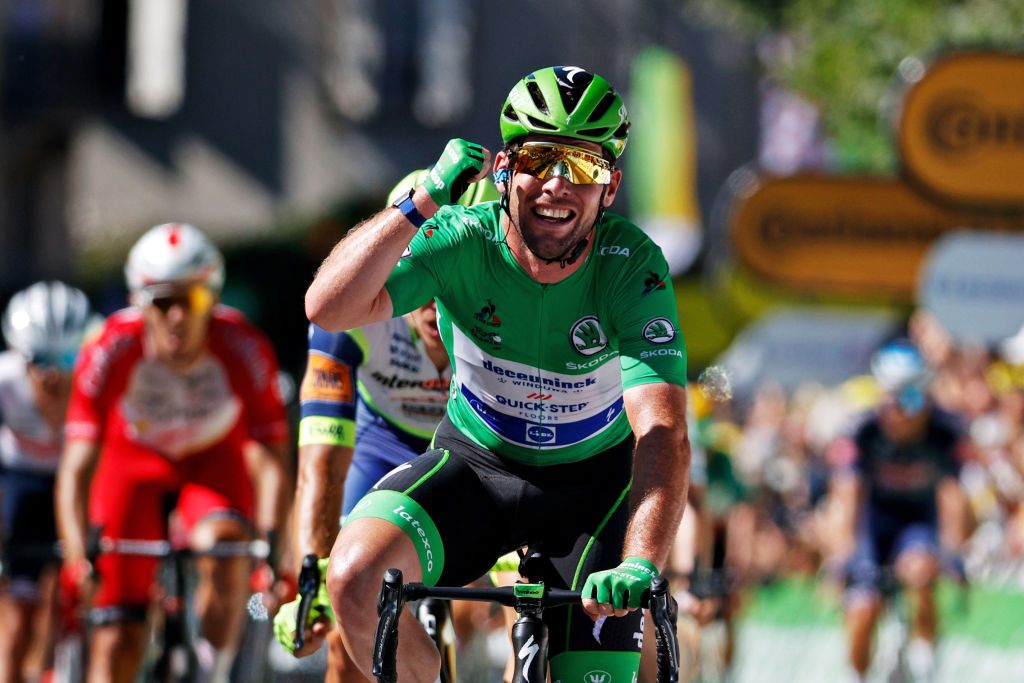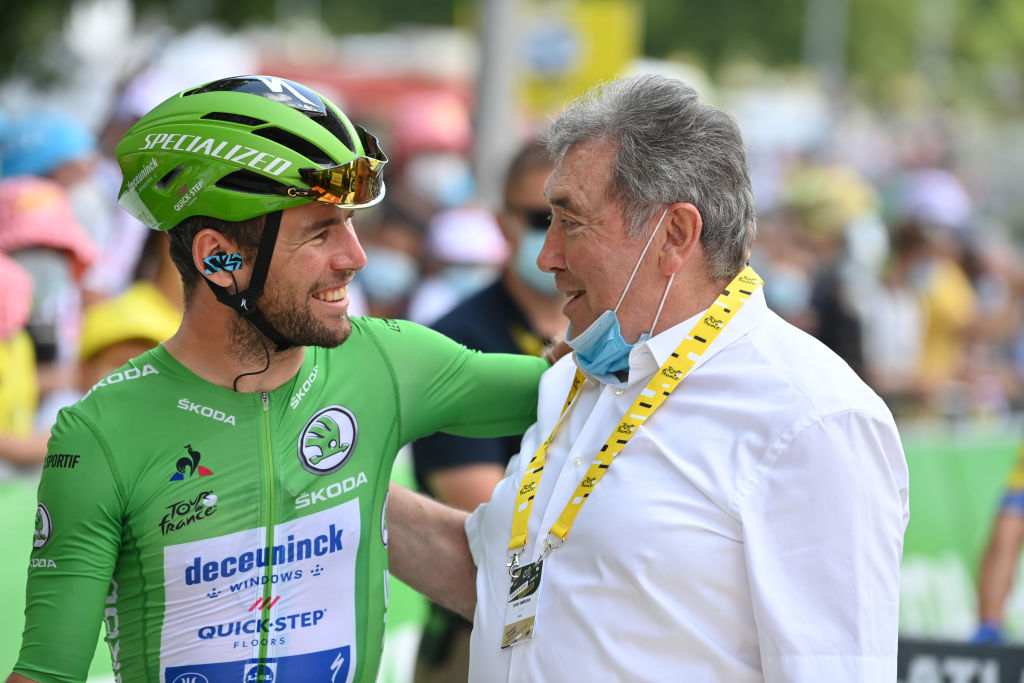Mark Cavendish: Equal among firsts
Procycling looks back at the sprinter's record-equalling Tour de France

Mark Cavendish’s incredible comeback at the 2021 Tour de France, in which he won four stages and equalled Eddy Merckx’s stage-winning record, was the biggest story of the race. Procycling looks at the Manx sprinter’s achievement.
When the 2021 Tour de France route was revealed last year, fans with long memories might have noted that parts of it looked like a compilation of Mark Cavendish's greatest hits. Fougères, the finish town of stage 4, was the location of his 26th number one in 2015; Châteauroux, two days later, was an even more important part of the Cavendish narrative – it's where his first and 17th stage wins happened. Nîmes (win number 4) and of course Paris (numbers 10, 15, 20 and 23) were also on the itinerary.
Not that anybody was considering at that point the possibility of Cavendish even being at the Tour, let alone adding any stage victories to the career total of 30 he'd been frozen on since 2016 – a lot of things had to happen between the end of 2020 and June 2021 for that to transpire.
The 'Sliding Doors moment' is a beloved cliché of historians and writers. It describes incidents which alter a life's trajectory and change future events. Sometimes it's epiphanic, sometimes a nudge, but in retrospect it is highly consequential. In Cavendish's case, there was a whole series of sliding doors moments – a sequence of improbable events which opened up a pathway to the four stage wins that he took.
Towards the end of 2020, Cavendish looked washed up and beaten. In an emotional mixed zone interview after Gent-Wevelgem, he admitted that he might be riding his last races as a professional, following four very lean years during which Epstein-Barr virus, clinical depression and poor form had ravaged his career. His Bahrain McLaren team were not renewing his contract, and options were few.
It was only when Deceuninck-Quick Step offered him a ride on the condition he brought a sponsor in with him that he secured employment for 2021, and it looked like the legendarily pragmatic and unemotional Patrick Lefevere had for once made a decision with his heart and not his head. Observers assumed that he would get to bow out quietly, but on his own terms. That contract was the first sliding doors moment.
There were many more. Cavendish found form and confidence and was up there in some of the Belgian semi-Classics at the start of the season, though still getting beaten in the sprints. But at the Tour of Turkey, he started to win, and took four stages, albeit against a thin field. At the Belgium Tour, he won a stage against stiffer opposition, including Tim Merlier, Pascal Ackermann, Caleb Ewan and Dylan Groenewegen.
Get The Leadout Newsletter
The latest race content, interviews, features, reviews and expert buying guides, direct to your inbox!
At the same time, Deceuninck-QuickStep's sprint leader Sam Bennett developed a knee injury and fell out with the team's management, and since the team was geared up to contest the Tour with a sprinter, and Bennett was hobbled, the best replacement would be Cavendish.
And though Cavendish would bristle at the suggestion that he only won stages at the Tour because the sprinting field wasn't at full strength, there were a few more helpful events: Jumbo-Visma would focus on GC, leaving Groenewegen at home; Ackermann was a non-selection for Bora-Hansgrohe, Ewan crashed and broke his collarbone on stage 3…
However, a Tour stage win is a Tour stage win, and the winner is always right. Plus, with fewer sprinters in the field, Deceuninck-QuickStep had to shoulder a lot of the responsibility of chasing breaks and on two occasions – in Nîmes and Libourne – they just gave it up. Nobody, perhaps not even Cavendish himself, could have foreseen the pathway that almost miraculously opened up in front of him this year, like gaps opening up in a sprint. But that is how life, and sprints work.
A textbook lead out
For Cavendish, wins are like children – you cannot have a favourite. The four that he won, stage 4 in Fougères, stage 6 in Châteauroux, stage 10 in Valence and stage 13 in Carcassonne, each had their unique qualities, though there were a few things in common.
In Fougères, the bunch almost blew it. There had been a break of two riders – Cofidis's Pierre-Luc Périchon and Lotto Soudal's Brent Van Moer - which should have been easily containable. Yet nobody took responsibility for the chase even deep into the final 10 kilometres, and while Van Moer, now alone, pressed on ahead, the sprinters' teams eyeballed each other and soft-pedalled, to the point that Van Moer had a lead of a minute with 6.5 kilometres to go.
Even as the peloton woke up, with Alpecin-Fenix, Groupama-FDJ and Deceuninck-QuickStep starting to ride, Van Moer was losing a second per hundred metres, which meant that he was going to get caught very close to the line indeed – holding off the bunch was well within the margin for error. The sprint actually unfolded around the Belgian – Cavendish had to alter his line to go around him as he launched off the back of Jasper Philipsen's jump. It was a messy sprint.

Cavendish described his second win, in Châteauroux, as a "textbook lead out". An overhead television shot of the peloton with just over 13 kilometres to go showed all eight Deceuninck-QuickStep riders in a line behind a single Alpecin-Fenix rider at the front. The team held that position at the front of the bunch, mainly on the left of the road, all the way to the line, albeit with a dwindling number as they used up their resources.
With four kilometres to go, there were still six DQS riders in a line at the front. At two kilometres, Julian Alaphilippe went to the front and led the peloton until 1.3 to go. Davide Ballerini led until 400 to go, then Michael Mørkøv took over, but by that point Alpecin-Fenix had already made their move and Cavendish switched trains to theirs before coming past and beating Philipsen in the final dash to the line.
Stage 10 was at once more complicated and more straightforward. As crosswinds hit the peloton in the final part of the stage, Cavendish's movement in the bunch was a masterclass in energy saving and positioning. He rotated around in the wash of riders just behind the front, never putting his nose in the wind but at the same time, being ahead of any weak points in the peloton that might split.
At some points, while riders and teams were pedalling furiously to hold position on the windward side and fighting to be at the front, Cavendish was matching their speed, but virtually freewheeling.
The sprint itself was another textbook lead out, maybe even better than that of Châteauroux – Dries Devenyns on the front for 400 metres at 4 kilometres to go, then Alaphilippe until 2.8 kilometres out, Mattia Cattaneo for another 700 metres, Alaphilippe again for a hundred metres or so, Kasper Asgreen with a long turn to take it 650 metres out, then Ballerini and Mørkøv, and finally Cavendish.
It was as if the team were passing a very valuable object carefully from one rider to the next, and finally presenting it to Cavendish, for whom the victory was a gift.
Stage 13 was the messiest win of all. The lead out was operating as normal until 650 metres to go, but Team DSM dive bombed round the outside of a left-hand bend and pulled several riders in front of the Deceuninck-QuickStep line. Cavendish found himself separated from his lead out, and a dozen riders back. He had to jump around Nacer Bouhanni and Michael Matthews, still found himself boxed in, and it was only when Iván García Cortina jumped 200 metres out that the way ahead miraculously cleared and the path to victory opened up. It was an effective metaphor for Cavendish's life path over the last year or so.

These, then, are the nuts and bolts of the four wins, but to describe just the cycling actions is to miss some more important parts of the story. That Cavendish is a brilliant and generational cyclist is beyond doubt. He's made a lot of his comparatively mediocre numbers in lab tests throughout his career, but first of all, his numbers are probably quite good. Secondly, the way he manages himself through a race mean that the numbers he produces in the finishing sprint are a lot closer to his base laboratory numbers than those his rivals manage. And thirdly, he's one of the most intense and emotional riders in the peloton.
It's the combination of these factors that makes him brilliant, and if anything is the biggest part of his success, it's the intensity and emotion, which are like catalysts in an explosive chemical reaction. He has mellowed a little over the years, but he remains and probably always will remain an intense individual, for better and for worse. Without the intensity, he doesn't win bike races, which is why the resigned, low-energy Cavendish of the last few years was barely contesting sprints, let alone in a position to win one.
The 2021 Tour was a medley of Cavendish's greatest hits, especially in Châteauroux, where he won for the third time in his career. But we also saw all the other typical Cavendish tropes through the race – tears, highs, lows, fractiousness, memorable and engaged mixed zone interviews, intensity, righteous hugs, scowls and even a video uploaded to social media showing him quite spectacularly losing his rag with one of his team mechanics.
The transgression looked in no way enough to justify the elemental yell Cavendish directed at the hapless wrencher, but the Manxman has always been a character of extremes. He's capable of great sweetness and light, and also being like a petulant child. You can't like one without accepting that the other also comes with the package.
Making history
Through the 2021 Tour, Cavendish refused to treat any of his wins as part of a wider oeuvre. Each win, be it the first or the 31st, is special and stands alone, he insisted. And he maintained that line through wins 32, 33 and even as the greatest sprinter there has ever been equalled the stage victory record held by the greatest cyclist there has ever been.
"I never give it any thought," Cavendish said at the start of the race, saying that the comparison between himself and Merckx was confected by the press.
However, the achievement in equalling the Merckx total is one of the greatest in cycling in this century, no matter how irrelevant to the man who has actually done it. Greatness can be an elusive, qualitative concept, so cycling fans sometimes attempt to define it by quantifying whatever they can.
It is written into cycling lore that five Tour wins is the record, that Merckx won Milan-San Remo seven times and that nobody has so far managed to win the Tour of Flanders more than three times. It's natural to count Tour stages, just as a way to keep score, and we have watched Cavendish overtake some of the greatest and most prolific Tour cyclists in history in André Darrigade, André Leducq, Bernard Hinault, and, now, he is finally level with Merckx.

It was pointed out that Cavendish did not have the palmarès of Merckx and that the Belgian achieved his wins in sprints, mountain stages and time trials. This is true, and neither diminishes Cavendish's achievement nor changes the fact that on that one metric – who has won the most Tour de France stages – Cavendish and Merckx were equally good.
Despite ending the Tour on level pegging with the Cannibal, though, it may end up being one of the biggest disappointments of Cavendish's career that he was not able to win the Champs-Élysées stage on the final day. For once Deceuninck-QuickStep's lead out was caught out as a large number of riders surged on the other side of the road with 2.5 kilometres to go and put Cavendish far back.
He did get back into a decent position in the last kilometre and put himself on Wout van Aert's wheel hard against the barriers on the left-hand side, but this time the path simply never opened up. Alpecin-Fenix's sprint operation to his right, kept him boxed behind Van Aert, and the Belgian, still quite tight against the barriers, kept a straight line all the way to the finish. Sometimes that is also how life, and sprints, work.
Cavendish has won a lot of big races – to his Tour triumphs you can also add Giro and Vuelta stages, plus the 2009 Milan-San Remo and 2011 Road World Championships. But there are a few that also got away and may remain regrets.
The 2012 Olympic road race was one of these – he was the favourite on a course which wasn't too complicated for him, but the five-man GB team couldn't control it. He sprinted at the 2016 Worlds in Qatar, went left instead of right and found the door closed. He was the silver medallist at the 2016 Olympic omnium. And to this list, we can add the Champs-Élysées sprint of 2021.
The 35th win will have to wait. It's unimaginable, now that Cavendish has won another four Tour stages, that he will stop before trying to win more. But life and sprints can be straightforward, or they can be messy and unpredictable. Mark Cavendish probably understands that more than most.
Procycling magazine: the best writing and photography from inside the world's toughest sport. Pick up your copy now in all good newsagents and supermarkets, or get a Procycling subscription.
Edward Pickering is Procycling magazine's editor. He graduated in French and Art History from Leeds University and spent three years teaching English in Japan before returning to do a postgraduate diploma in magazine journalism at Harlow College, Essex. He did a two-week internship at Cycling Weekly in late 2001 and didn't leave until 11 years later, by which time he was Cycle Sport magazine's deputy editor. After two years as a freelance writer, he joined Procycling as editor in 2015. He is the author of The Race Against Time, The Yellow Jersey Club and Ronde, and he spends his spare time running, playing the piano and playing taiko drums.